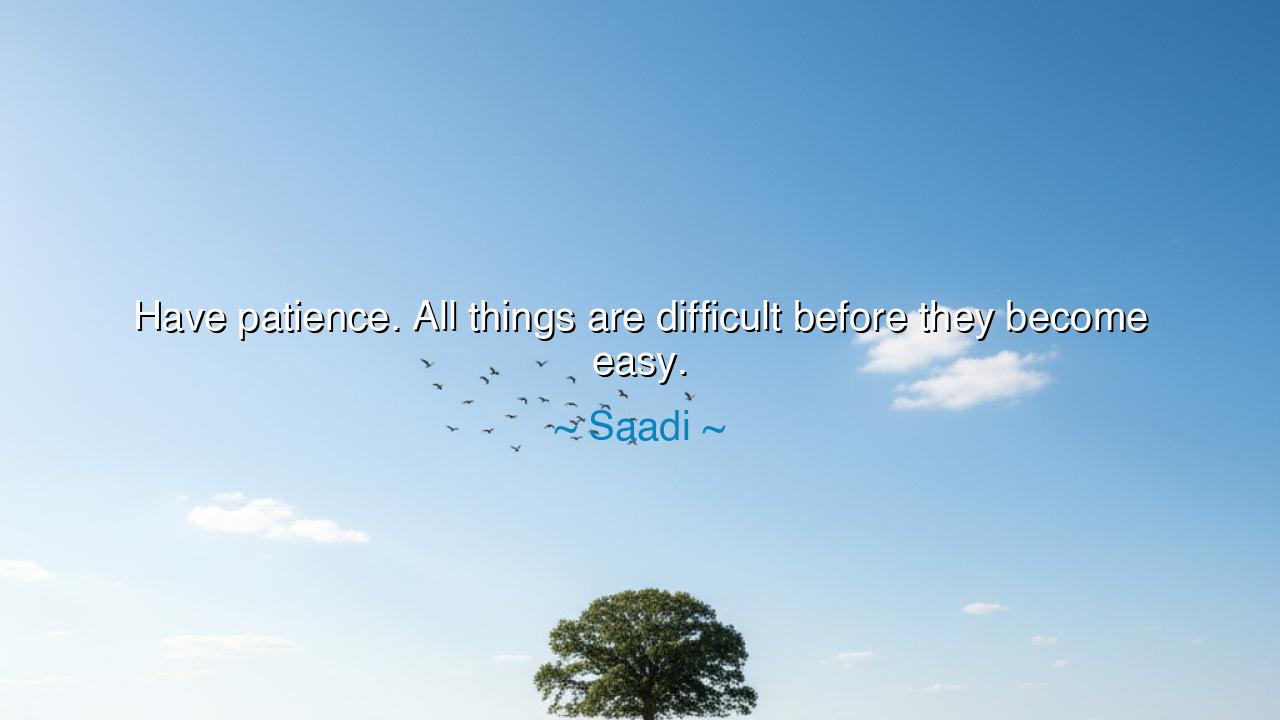
Have patience. All things are difficult before they become easy.






Hear the ancient words of Saadi, the sage of Shiraz, whose wisdom flowed like rivers into the hearts of generations: “Have patience. All things are difficult before they become easy.” These words are not mere counsel for the weary, but a lamp for the traveler who walks through the dark valleys of struggle. For life, in all its majesty, demands from us toil and trial before it yields its treasures. The soil must be broken before it brings forth wheat, the iron must endure the fire before it becomes a blade, and the soul must endure hardship before it knows peace.
The meaning of this teaching is clear: in the beginning, every path feels steep, every burden feels unbearable, every skill feels beyond our reach. Yet with patience, the hand grows steady, the mind grows sharp, and what was once impossible becomes as natural as breathing. It is not the difficulty that defeats us, but our surrender to despair. Saadi, in his wisdom, reminds us that time itself is an ally, and those who endure shall see the fruit of their persistence.
Consider the story of Thomas Edison, who sought to bring light into the homes of men through the power of electricity. He did not discover the filament at his first attempt, nor his tenth, nor even his hundredth. History tells us he failed over a thousand times before the lamp finally shone. Had he abandoned his quest in the shadow of difficulty, the world might still be lit only by fire and candle. But through patience, what was once a daunting and nearly impossible challenge became simple, even ordinary, for generations to come. Thus, Edison’s struggle is a living echo of Saadi’s truth.
The ancients knew this lesson well. The warrior did not wield the sword with grace at first, but stumbled and faltered in training. The scholar did not recite the verse with ease at first, but stumbled over syllables until the tongue grew fluent. Even the child, before taking his first steps, falls again and again, bruised yet unbroken. All beginnings are wrapped in difficulty, and yet all mastery is clothed in ease. The difference between the two is nothing but patience.
But let us not confuse patience with idleness. To wait without striving is not patience but sloth. True patience is the strength to labor, to struggle, to rise after falling, and to keep faith that the dawn will follow the night. It is an active endurance, a steady flame that neither storm nor shadow can extinguish. This is the patience Saadi calls us to embrace: a courage that bends but does not break.
So, children of tomorrow, what lesson must you carry from this? When you find yourself at the beginning of a hard journey—whether learning a new craft, striving for a noble dream, or enduring trials of the heart—do not curse the weight of difficulty. Instead, whisper to yourself, “This too shall become easy, if only I endure.” For every master was once a beginner, every wise one once a fool, every victor once trembling in defeat.
The actions you must take are simple yet profound: when faced with hardship, do not retreat. Take one step, then another, even if they are small. Mark your progress not in leaps, but in steady breaths. Celebrate the smallest victories, for they are the stones that pave the road to mastery. And when despair whispers in your ear, answer it with the voice of Saadi: “All things are difficult before they become easy.”
Thus, O seeker, carry this wisdom in your heart as a shield against despair. For if you have patience, the mountain shall become a path, the burden shall become light, and the impossible shall bow before your persistence. This is the ancient promise, spoken by Saadi, and proven by the lives of all who refused to surrender.






AAdministratorAdministrator
Welcome, honored guests. Please leave a comment, we will respond soon